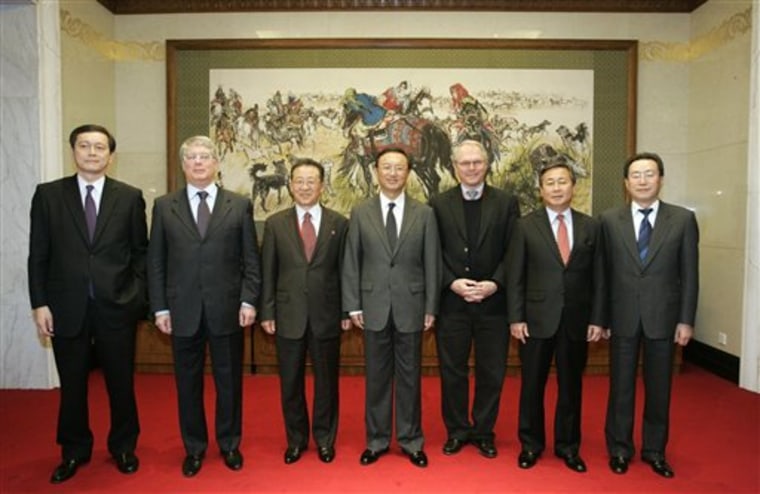Envoys failed to agree Thursday on how to verify North Korea's past atomic activities in the latest round of talks on the country's nuclear program, all but extinguishing hopes of a successful legacy on the issue by the outgoing Bush administration.
The deadlock means that the North Korea nuclear issue will be one of the many challenges facing President-elect Barack Obama when he takes office in January.
"We had some very ambitious plans for this round. Unfortunately, we were not able to complete some of the things we wanted to do," Christopher Hill, the chief U.S. negotiator, told reporters before leaving Beijing. "Ultimately (North Korea) was not ready to reach a verification protocol with all the standards that are required."
He did not elaborate what differences remained.
Frustration in current talks
The current round of six-nation talks was marked by frustration over the North's refusal to put into writing any commitments on inspection, making it impossible to move forward on an disarmament-for-aid agreement.
Charles K. Armstrong, director of Columbia University's Center of Korean Research, said that with North and South Korean relations deteriorating and a lame duck presidency in the U.S., "the North Koreans seem not to have been particularly interested in coming to an agreement at this time."
Paik Hak-soon of the Sejong Institute said the North Koreans were likely to be more open with Obama, who emphasized during his campaign a willingness to hold direct talks — including possibly meeting with the country's authoritarian leader, Kim Jong Il.
Armstrong said North Korea appeared to be "waiting until Obama comes into office, and perhaps then they will be more forthcoming."
"But there will be many bumps along the road," he said. "It may be a long time before the nuclear issue is completely resolved."
The Bush administration expressed disappointment Thursday with the lack of progress.
"What's unfortunate is that the North Koreans had an opportunity here," White House press secretary Dana Perino said. "There was an open door, and all they had to do was walk through it."
Bush's hard-line stance
Bush had adopted a hard-line stance toward North Korea when he first took office, characterizing the communist regime as a member of an "axis of evil" that also included Iran and Iraq.
His position has since softened, with the U.S. sending envoys to Pyongyang and removing North Korea from a list of state sponsors of terrorism. That was part of a broader "action for action" plan in which North Korea gets diplomatic concessions and economic aid from the other countries in exchange for ridding itself of a nuclear weapons program and coming clean about its past work.
"U.S. policy toward North Korea under Bush can be considered a modest success at best," Armstrong said. "At least it evolved from a dangerous confrontation to a dialogue."
Paik, a senior fellow at the private security think tank near Seoul, said the administration's tough tactics still stir up mistrust in Pyongyang because of a drawn-out dispute with Washington centered around the extent of the regime's nuclear programs, including an alleged uranium enrichment program.
"North Korea does not have enough confidence or trust in the people in Washington," Paik said. "The series of demands from U.S. negotiators have been interpreted as something negative."
Prospects bleak from beginning
Prospects for a breakthrough at this week's talks were bleak from the start, with North Korea rejecting a proposal by host China on the verification process, the basis for future discussions.
Kim Sook, South Korea's top delegate, said the North, however, was ambiguous about its preferred protocol and did not offer any revisions to the Chinese draft.
While details of the document have not been made public, delegates said it included provisions on visits to nuclear sites and sampling by inspectors, which Pyongyang has refused to allow.
North Korea submitted an inventory of its past activities in June. U.S. officials said Pyongyang agreed previously to allow experts to conduct forensic tests at all of its declared nuclear facilities and undeclared sites, and take samples — a crucial method of checking whether its accounting of its nuclear programs was truthful.
But the North says it agreed only to let nuclear inspectors visit its main atomic complex in Yongbyon, view related documents and interview scientists.
Japan and Russia are also involved in negotiations, which began in 2003 and have progressed incrementally amid rocky relations between the U.S. and North Korea.
A new round of negotiations has not been scheduled but Chinese envoy Wu Dawei, the chairman of the talks, said they would take place at "an early date."
